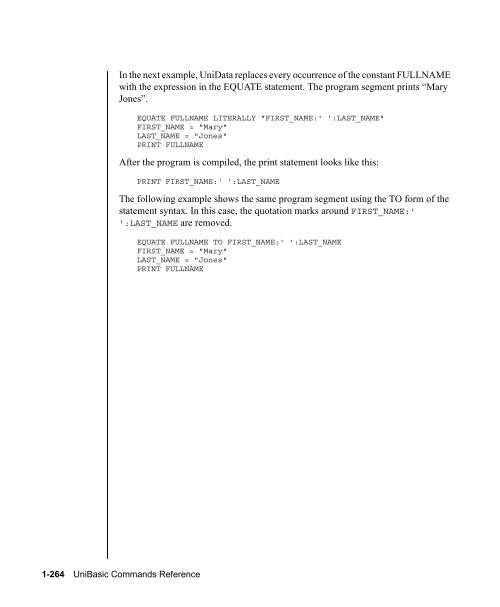UniBasic Commands Reference - Rocket Software
UniBasic Commands Reference - Rocket Software UniBasic Commands Reference - Rocket Software
In the next example, UniData replaces every occurrence of the constant FULLNAME with the expression in the EQUATE statement. The program segment prints “Mary Jones”. 1-264 UniBasic Commands Reference EQUATE FULLNAME LITERALLY "FIRST_NAME:' ':LAST_NAME" FIRST_NAME = "Mary" LAST_NAME = "Jones" PRINT FULLNAME After the program is compiled, the print statement looks like this: PRINT FIRST_NAME:' ':LAST_NAME The following example shows the same program segment using the TO form of the statement syntax. In this case, the quotation marks around FIRST_NAME:' ':LAST_NAME are removed. EQUATE FULLNAME TO FIRST_NAME:' ':LAST_NAME FIRST_NAME = "Mary" LAST_NAME = "Jones" PRINT FULLNAME
EREPLACE Syntax EREPLACE(expression, substring, replacement [,occurrence [,begin] ] ) Description The EREPLACE function replaces substring in expression with another substring. If you do not specify occurrence, each occurrence of substring is replaced. Parameters The following table describes each parameter of the syntax. Parameter Description expression The expression in which you want to replace substring. substring The substring you want to replace. If substring is an empty string, replacement is prefixed to expression. If replacement is an empty string, all occurrences of substring are removed. replacement The replacement value for substring. occurrence Specifies the number of occurrences of substring to replace. To replace all occurrences, specify occurrence as a number less than 1. begin Specifies the first occurrence of substring to replace. If you omit begin, or specify a value less than 1, it defaults to 1. EREPLACE Parameters If expression evaluates to the null value, null is returned. If substring, replacement, occurrence, or begin evaluates to the null value, the EREPLACE function fails and the program terminates with a run-time error message. Note: The EREPLACE function behaves like the CHANGE function except when substring evaluates to an empty string. EREPLACE 1-265
- Page 220 and 221: DQUOTE DQUOTE is a synonym for the
- Page 222 and 223: Related Commands UniBasic PRECISION
- Page 224 and 225: ECHO Syntax ECHO [ON | OFF | expr]
- Page 226 and 227: EDADRV_CloseStmt Syntax RETCODE EDA
- Page 228 and 229: EDADRV_Connect Syntax RETCODE EDADR
- Page 230 and 231: EDADRV_Disconnect Syntax RETCODE ED
- Page 232 and 233: 1-226 UniBasic Commands Reference
- Page 234 and 235: Return Codes The following table de
- Page 236 and 237: Output Variable The following table
- Page 238 and 239: Output Variables The following tabl
- Page 240 and 241: EDADRV_GetDBInfo Syntax RETCODE EDA
- Page 242 and 243: EDADRV_GetEDAAttr Syntax RETCODE ED
- Page 244 and 245: EDADRV_GetErrmsg Syntax RETCODE EDA
- Page 246 and 247: Input Variables The following table
- Page 248 and 249: EDADRV_LoadSymbols Syntax RETCODE E
- Page 250 and 251: Output Variables The following tabl
- Page 252 and 253: Return Codes The following table de
- Page 254 and 255: Input Variables The following table
- Page 256 and 257: STATUS Codes ENABLEDEC has the foll
- Page 258 and 259: Parameter Description dataLoc 1 - D
- Page 260 and 261: Parameters he following table descr
- Page 262 and 263: END Syntax END Description The UniB
- Page 264 and 265: Related Commands UniBasic CALL, CHA
- Page 266 and 267: Examples In the following example,
- Page 268 and 269: EQU Syntax EQU constant1 TO value1
- Page 272 and 273: EXECUTE Syntax EXECUTE "str.expr" [
- Page 274 and 275: Parameter Description Reminder: The
- Page 276 and 277: Related Commands UniBasic COMMON, E
- Page 278 and 279: Parameter Description Examples In t
- Page 280 and 281: The program output is: 1-274 UniBas
- Page 282 and 283: EXP Syntax EXP(expr) Description Th
- Page 284 and 285: Examples The following program segm
- Page 286 and 287: In the next example, the program se
- Page 288 and 289: Options The value of option determi
- Page 290 and 291: FILEINFO Syntax FILEINFO(file.var,
- Page 292 and 293: Code 9 Merge factor percentage 10 S
- Page 294 and 295: FILELOCK Syntax FILELOCK [file.var]
- Page 296 and 297: FILEUNLOCK Syntax FILEUNLOCK [file.
- Page 298 and 299: FIND Syntax FIND expr IN dyn.array[
- Page 300 and 301: Related Commands UniBasic [], FINDS
- Page 302 and 303: Parameter Description Examples In t
- Page 304 and 305: FMT Syntax FMT(expr, "len [f.char]
- Page 306 and 307: STATUS Function Return Values After
- Page 308 and 309: FOOTING Syntax FOOTING [ON num.expr
- Page 310 and 311: Related Commands UniBasic GETPTR, H
- Page 312 and 313: This program segment produces the f
- Page 314 and 315: Parameter Description Examples The
- Page 316 and 317: FUNCTION Syntax FUNCTION function.n
- Page 318 and 319: The following program calls the pre
In the next example, UniData replaces every occurrence of the constant FULLNAME<br />
with the expression in the EQUATE statement. The program segment prints “Mary<br />
Jones”.<br />
1-264 <strong>UniBasic</strong> <strong>Commands</strong> <strong>Reference</strong><br />
EQUATE FULLNAME LITERALLY "FIRST_NAME:' ':LAST_NAME"<br />
FIRST_NAME = "Mary"<br />
LAST_NAME = "Jones"<br />
PRINT FULLNAME<br />
After the program is compiled, the print statement looks like this:<br />
PRINT FIRST_NAME:' ':LAST_NAME<br />
The following example shows the same program segment using the TO form of the<br />
statement syntax. In this case, the quotation marks around FIRST_NAME:'<br />
':LAST_NAME are removed.<br />
EQUATE FULLNAME TO FIRST_NAME:' ':LAST_NAME<br />
FIRST_NAME = "Mary"<br />
LAST_NAME = "Jones"<br />
PRINT FULLNAME



